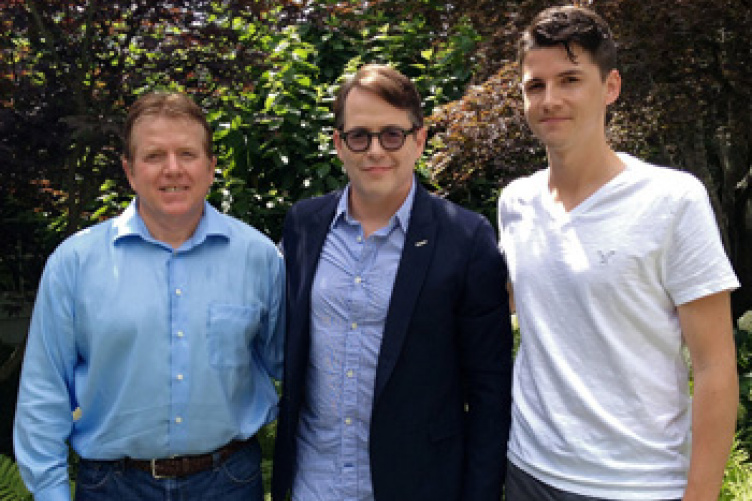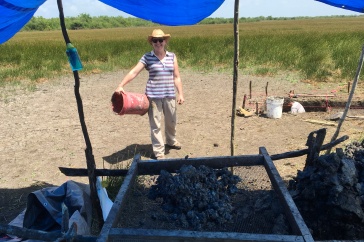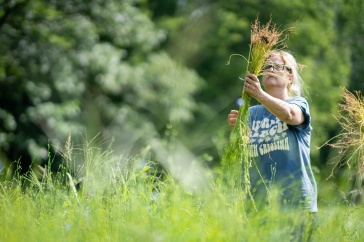
(l to r) Jim Conant, Matthew Broderick, and Sean Conant (© 2013 RISING PICTURE COMPANY)
What started out as a father-son quest to view all five copies of the Gettysburg Address during 2013, the 150th anniversary of the address, has turned into a historical documentary project for a first-year student who is majoring in history and hopes to have a career as a documentary filmmaker.
The far-reaching project has taken Sean Conant and his father Jim, of Hampton, N.H., across the country to speak with prominent historians, to Midland, Texas, to interview First Lady Laura Bush, and to the White House to view the Bliss copy of the Gettysburg Address, which is displayed in the Lincoln bedroom.
"We're producing the definitive look of the Gettysburg Address. That's a huge responsibility! We're not only detailing slavery, the Civil War, the Battle of Gettysburg, Lincoln's visit to Gettysburg, and the five copies of the address, but we're also chronicling the significant invocations of the Gettysburg Address," Sean Conant says.
The Gettysburg Address features interviews with historians Harold Holzer, James McPherson, Douglas L. Wilson, Allen Guelzo, Henry Louis Gates, Jr., Michael Burlingame, Senators Dick Durbin and Kelly Ayotte, former New Hampshire Gov. Jeanne Shaheen, New Hampshire Governor Maggie Hassan, actor Matthew Broderick, and journalist Tom Brokaw.
"We had to search for, recognize, and locate every historian with an important piece of the puzzle. This is the far-reaching nature of the film; I think many people will learn for the first time exactly how those 272 words affected the world, not just America," Conant says.
Conant and his father always have had an interest in Lincoln and the Civil War so when Conant's dad proposed last February that the two see all five copies of the Gettysburg address in 2013, Conant thought it was a great idea. The five copies of the Gettysburg Address are the Nicolay and Hay copies at the Library of Congress; the Everett copy at the Abraham Lincoln Presidential Library and Museum in Springfield, Ill.; the Bancroft copy at Cornell University; and the Bliss copy at the White House.
"They're not always out on display. We've been unlucky in the past when we've been at a couple of these places, excited to see a Gettysburg Address, only to be told it was on conservational rest or being cleaned that particular day—not on display. It was frustrating," Conant says.
Initially, the Conants had no plans to film their travels. It was simply meant to be a father-son experience.
Once the Conants began researching the exhibition schedules and logistics of the five copies of the Gettysburg Address, they realized that the Bliss copy is virtually only displayed in the Lincoln bedroom at the White House. The last time it had been publicly displayed was for six short weeks in 2008-09 at the Smithsonian Museum. Prior to that, the last time it was publicly displayed was 1972.
|
Sean Conant (right) and his father Jim, of Hampton, spoke with First Lady Laura Bush who talked about her unique perspective on living with a copy of the Gettysburg Address, the Bliss copy displayed in the Lincoln bedroom. (© 2013 RISING PICTURE COMPANY) |
"We were crushed! But we were determined to see that manuscript somehow. The Bliss copy was willed to the American people in the 1950s by a former Cuban Ambassador Oscar Cintas, but with a provision that it be kept in the Lincoln bedroom at the White House," Conant says.
"This was logistically impractical from our point of view. I mean, you just don't 'stroll' into the Lincoln bedroom on the White House tour—it's on the second floor, in the president's private living quarters. Needless to say, it became a sort of mission of ours to get this copy put on public display, not only for our benefit but for every American wishing to see this rarely exhibited treasure," he says.
It was at this point that Conant's father Jim thought that they should start documenting their effort and conduct interviews for a documentary. "Most of our 'star power' isn't in Hollywood celebrities, but in these great historians that have devoted decades of their lives to researching and writing and editing all the amazing material that has proved invaluable to us. They are the real stars of the film," Conant says.
"I'm less nervous now when we meet for these interviews because we've done so many. Still, it's strange to be literally directing these people. We went to Long Island to film with Matthew Broderick. He's sitting in the chair getting his makeup done, asking me questions and needing direction. It was kind of surreal. My dad was very nervous about interviewing Tom Brokaw," he says.
One of the highlights of making the documentary has been the Conants' interview with First Lady Laura Bush, who they interviewed at the George W. Bush Institute in Dallas. "She spoke passionately about all aspects of the Gettysburg Address. It will be a great addition to the film—her unique perspective on living with a copy of the Gettysburg Address. She even offered additional insights for the film, likening the ideology that Lincoln expressed in the Gettysburg Address to that of Czech dissident and freedom fighter Václav Havel, whom she greatly admired," Conant says.
And finally, the father and son were able to view the Bliss copy of the Gettysburg Address thanks to an invitation from White House curator William Allman, inviting them to film at the White House. They also viewed the Bancroft copy at Cornell, as well as copies of the Emancipation Proclamation and the 13th Amendment.
"It used to be that American schoolchildren memorized the Gettysburg Address. I don't think they've done that for a very long time, in most places, at least," Conant says. "I think most people today are more unfamiliar with our country's history than ever before. I hope they walk away from the film with a greater understanding of those inspiring words, and recognize that the speech continues to affect our democracy even today."
The Conants hope to release The Gettysburg Address in spring 2014 and screen it at UNH.
In addition to The Gettysburg Address, the Conants also are considering a documentary about U.S. Brigadier General Joshua Chamberlain and the 20th Maine Volunteer Infantry Regiment, which is known for its defense of Little Round Top at the Battle of Gettysburg. Recently Conant and his father met with acclaimed historian Thomas Desjardin at the Joshua L. Chamberlain Museum in Brunswick, Maine.
"I was staring at Chamberlain's boots from Little Round Top and the lead slug that shattered his hips at Petersburg. Incredible!" Conant says. "We're so lucky to have museums and artifacts that can connect us in such a unique and powerful way to history. I walked away with an even greater appreciation of the man—the experience was inspiring. That's what I hope people will walk away from our film feeling—inspired."
The Text of the Gettysburg AddressDelivered November 19, 1863 in Gettysburg, Pennsylvania Four score and seven years ago our fathers brought forth, on this continent, a new nation, conceived in Liberty, and dedicated to the proposition that all men are created equal. Now we are engaged in a great civil war, testing whether that nation, or any nation so conceived and so dedicated, can long endure. We are met on a great battle-field of that war. We have come to dedicate a portion of that field, as a final resting place for those who here gave their lives that that nation might live. It is altogether fitting and proper that we should do this. But, in a larger sense, we can not dedicate—we can not consecrate—we can not hallow—this ground. The brave men, living and dead, who struggled here, have consecrated it, far above our poor power to add or detract. The world will little note, nor long remember what we say here, but it can never forget what they did here. It is for us the living, rather, to be dedicated here to the unfinished work which they who fought here have thus far so nobly advanced. It is rather for us to be here dedicated to the great task remaining before us—that from these honored dead we take increased devotion to that cause for which they here gave the last full measure of devotion—that we here highly resolve that these dead shall not have died in vain—that this nation, under God, shall have a new birth of freedom—and that government of the people, by the people, for the people, shall not perish from the earth. From the Bliss copy, Wikisource |
Originally published by:
The College Letter, Newsletter for the College of Liberal Arts
-
Written By:
Staff writer | Communications and Public Affairs




















































